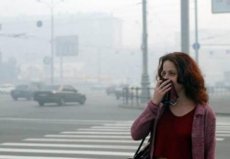New publications
Poor environment triggers rickets in newborns
Last reviewed: 01.07.2025

All iLive content is medically reviewed or fact checked to ensure as much factual accuracy as possible.
We have strict sourcing guidelines and only link to reputable media sites, academic research institutions and, whenever possible, medically peer reviewed studies. Note that the numbers in parentheses ([1], [2], etc.) are clickable links to these studies.
If you feel that any of our content is inaccurate, out-of-date, or otherwise questionable, please select it and press Ctrl + Enter.

The baby's health depends not only on the mother's proper nutrition, healthy lifestyle and physical activity, but also on the air she breathes.
In many large cities, air pollution is a major problem. Ecologists say the main reason for this problem is the low mobility of air masses, in particular due to temperature inversions.
We breathe a "cocktail" of hundreds of chemical substances of organic and inorganic nature. The sources of harmful impurities in the air are transport and industrial enterprises.
Polluted air is dangerous and can cause chronic heart and respiratory diseases. Scientists have found out why polluted air is dangerous for women who are "in position".
Polluted air that pregnant women breathe can affect the decrease of vitamin D levels in newborns. This is especially dangerous in the last months of pregnancy.
This is the conclusion reached by French scientists from the National Institute of Health and Medical Research.
"We found a link between maternal exposure to air pollution and the amount of vitamin D in the infant's serum," said lead author Nur Baiz. "Our findings may be the first to show that air quality affects vitamin D levels in newborns, which may be a cause of vitamin D-related diseases."
The scientists' studies involved 375 pregnant women. Exposure to nitrogen dioxide in the air and particulate matter smaller than 10 microns throughout the entire gestation period is the cause of vitamin D deficiency in infants. The greatest impact of air pollution was observed in the third trimester of pregnancy.
Vitamin D is necessary for normal bone metabolism. Its deficiency leads to rickets and the development of muscle weakness.
Experts are concerned about the health of future generations and say that if this environmental situation does not change, but only worsens, then humanity will face dire consequences.

 [
[